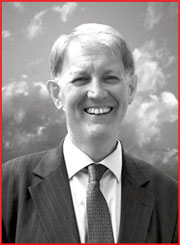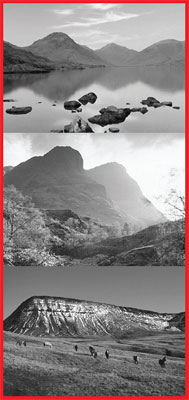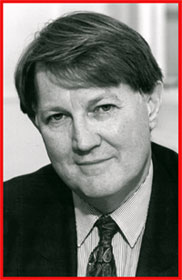This interview is with Professor Mike Richards for CANCERactive and was originally published in Issue 3, 2006 of the magazine icon.

Failure Is Not An Option
By Madeleine Kingsley
Just over a year ago, Professor Mike Richards, the UK’s first Cancer Czar, received an e-mail from his colleague Professor Karol Sikora. Entitled, ’Nothing to do with Cancer’, it proposed that these two most eminent oncologists should jointly undertake The Three Peaks Challenge. This involved climbing Snowdon, Scafell Pike and Ben Nevis within 24 hours explains Richards, whose great off-duty passion is hill climbing. ’My answer was that I didn’t think I was fit enough!’ Karol’s next message said simply and (in respect of cancer prevention) suitably: ’Get fit!’
12 weeks later the adventure was successfully undertaken. Following a very happy drink at the pub in Fort William, the professorial pair fell, exhausted, on to the London-bound train and resumed their hard graft. What if they had attempted the climb and been forced to abandon? ’Failure,’ says the Professor unequivocally, ’was not an option’.
Pushing Forward the Cancer Agenda
And could the same be said of the 10 year, wide-ranging National Cancer Plan, meticulously devised by Prof Richards in 1999-2000, his first year in the post? ’Yes - entirely right!’, says the smart-suited man upon whose tireless efforts our healthier future depends. He conferred endlessly with clinicians, nurses, charities and patient groups before publishing what is, effectively, a Magna Carta of this all-too-prevalent disease. The idea is to promote excellence and establish the UK as a trailblazer in cancer prevention, screening, and early detection, through diagnosis to early treatment and optimum care.
Unencumbered by family obligations, Prof Richards spends hugely long hours among the books and papers of his unassuming office at St Thomas’ Hospital. The grandest feature of the Prof’s home from home is the view across the river, which surely gets more of a glance than a gaze. ’Since April 1 this year I’ve also been Chair of the National Cancer Research Institute, prompting some people to think I’ve given up the National Cancer Directorship which I haven’t’. So now he’s working night and day? ’That’s true,’! he quips, making rare time to tell icon how, just over half way through the decade, the National Plan is bearing fruit.
Professor Richards has been committed to cancer care for 25 years having trained as a medical oncologist, then taken up a research fellowship at Bart’s. His next move - to what is now the Cancer Research UK Breast Unit awakened his long-term interest in how to improve both survival rates and the quality of care for patients with cancer. ’In l995 I moved sideways and became Professor of Palliative medicine here at St Thomas’, he says, ’taking forward the work on quality of life particularly for people approaching its end’.
Deep Disparity of Care Standards

’I’d thoroughly enjoyed being a doctor and looking after my patients,’ Mike Richards stresses. ’I thoroughly enjoyed clinical research too’. But one unforgettable episode stands out as the spur to his assuming a management as well as his medical role. For eight years before taking up his national post, Mike Richards worked as Director both of cancer services and palliative care in the merged Guys and St Thomas’ Hospital.
’This wasn’t something I’d planned ahead. But 15 years ago I was asked by a consultant colleague outside London about the treatment he should give to a 32-year old with breast cancer, and whether or not she should have chemotherapy following her surgery. I asked whether the cancer had spread to the axillary lymph nodes, and he said that, unfortunately, the surgeons in his city do not remove lymph nodes. Then I asked well, what grade of cancer was it, looked down the microscope. And he said that, unfortunately, the pathologists did not grade cancer. I then asked how large was the tumour, and he said that, unfortunately, it was not recorded in this case’.
These three vital pieces of information would have been available at Guy’s as a matter of routine. It struck Mike Richards that, if this incident was not unique, then standards seemed to vary across the country. Working with the Thames Cancer Registry, he began looking at the patterns of cancer care across South East England. It emerged that this one blighted town was not alone - that variations were indeed major: ’I could have sat here in my ivory tower at a teaching hospital where, hopefully, the care is uniformly good. But what about good care for everybody? What could be done to ensure that the quality of care met the highest standards right across the board? His answer was to take on managerial responsibility, first locally and, by natural progression, on to a national level’.
Determined to drive the cancer agenda forward, Mike Richards worked with The British Breast Group, developing ideas on providing specialist team services. Their recommendations appeared at much the same time as the Calman-Hine report on cancer services, both raising consciousness of the uphill task ahead. ’I started talking with the Department of Health in terms of trying to drive the cancer agenda forward nationally. Calman-Hine was the first major turning point in England and Wales. It made a difference, but by l999 - when the PM held a summit in Downing Street, there was a general feeling that the pace of change was just not fast enough’. The moment when cancer was finally declared a top priority for the government soon led to Mike Richards key appointment.
National Cancer Plan - How’s it Working?
The art of juggling would not come amiss as Mike Richards endeavours to prioritise all aspects of the plan in progress. The end of 2005, for instance, focussed his attention especially on the issue of waiting times, for which targets had been set. Well over 99 per cent of people urgently referred by a GP are now being seen within two weeks and 99 per cent of those referred for treatment following diagnosis are also being treated within the allotted 31 days.

On both these fronts we need to do more

Mike Richards is proud of these figures and points out that the vast number of patients are now receiving treatment within one, two or three weeks, or else you wouldn’t bear getting the 99 per cent through within four weeks. ’So in the last six to eight months we’ve really seen what the NHS can do when it sets its mind to it. Where Trusts were finding it hard to streamline and redesign systems to get patients through quicker we have sent out intensive support teams to advise them. We’ve overcome a whole lot of obstacles in endoscopy and radiology, expanded the number of doctors, nurses and radiographers working in cancer. We’ve installed many more CT and MRI scanner and linear accelerators for radiotherapy, but on both these fronts we need to do more’.
Inevitably though he has also had to put his mind to matters beyond waiting times. ’Other things come to the fore where one doesn’t necessarily have control of the timing, such as summer last year when trial results showed that Herceptin was beneficial in early breast cancer. A lot of work ensued trying to prepare the NHS for the very good news that Herceptin has acquired its licence, which has been approved by NICE’.
Prof Richards is very pleased about this and particularly pleased that NICE completed that appraisal and published its draft guidance only two weeks after the drug was licensed. ’Behind the scenes NICE had worked for months in order to run parallel with the licensing process. This heralds, one hopes, the flowering of a seriously can-do attitude, appreciating that speed can make a life-saving difference to real people behind the statistics’.
Specialist Team Work
The National Cancer Plan has given a further push to the spread of specialist multi-disciplinary teams advocated by Calman-Hine. ’As our goal,’ says Prof Richards, ’every patient in this country with any of the cancers should have care overseen by a specialist team. We are getting very close to that goal, which, by the way, means, I believe, that we are world leaders in that regard. In the States only one in five patients goes to a comprehensive cancer centre where team-based care is on offer’.

We now have 160-170 such teams working in district
general hospitals

By no means complacent, Mike Richards won’t promise that the model is yet working perfectly nationwide, but speaks of fantastic progress with teams well-embedded and learning the necessary lessons about co-operation. With breast cancer, for example, we now have 160-170 such teams working in district general hospitals, with a similar number for lung and colorectal cancers. In South East London there may be half a dozen teams for breast or bowel cancer, but they network together across that patch and obviously work with one specialist centre for radiotherapy.
Screening Breast and Bowel
Expansion of breast screening to include women aged 65-70, and now offering two-view mammography on each visit, has brought a 40 per cent increase in tumour detection. Whereas 8,500 cases were identified per annum in England, the figure is now 12,000 and expected to grow. Where does Professor Richards stand on the theory that mammograms themselves may harm breast tissue, or that they may pick up cancers that would perhaps do no harm?

’There may be some picked up in the latter category,’ he says. ’Having said that, I am absolutely sure that the screening programme has contributed to the fall in death rate from breast cancer in this country. Back in the late l980s we were in the unenviable position of having the worst breast cancer death rate in the world. Since then we have had the steepest fall in breast cancer mortality. That is due to a combination of factors - to patients probably coming forward earlier and to better treatment particularly with drugs like Tamoxifen and chemotherapy. While we are seeing such a fall in death rates I would not want to remove any part of the programme. Bowel cancer screening has now begun, following a few months delay’.
Mike Richards sees it as a massive undertaking, not only in terms of getting home test kits out to people, but also then to provide the follow up services, like colonoscopy where tests prove positive. ’The most important thing, says Prof Richards, ’is that this screening programme is being rolled out across the country and I think that it will very soon be world-leading. The 60-69 age group is the first to be targeted because, being high risk, they are can benefit most. We have very good evidence from four randomised control trials and from large scale pilots in Warwickshire and parts of Scotland that the procedure is acceptable to the public and that this screening will save lives’.
Package of Prevention
On the smoking front, Professor Richards sees a job well done, with yet further to go. In the past five years, the adult smoker percentage has fallen from 28 to 25. He commends politicians for voting through the Commons with a 200 majority the ban on smoking in public places. Including schools, pubs and clubs, the ban from summer 2007 should impact on the young for whom health warnings don’t seem so urgent. As far as nutrition is concerned, however, the plan remains at a much earlier stage than the impatient among us would like.
’We’ve had the tobacco epidemic which peaked around l960 when a staggering 80 per cent of adult men were smokers. Now were facing the obesity epidemic, and very much aware of the associated health risks not only for cancer, but heart disease and diabetes. The healthy eating, five a day, fruit and veg campaign has communicated to the healthier middle classes more quickly. We now need to get the message across to people in different social circumstances. Some cancer preventionists recommend 10 not five a day, but the Professor stresses that pilot work shows that if everyone managed the five a day We would be making huge progress, given that some one fifth of the population eats one or none’.

Replacing the 1960s school milk with 21st century fruit and veg
for primary schoolkids

As much as the message, the logistics of accessing fruit and veg matters for people who don’t have cars and for whom affordability and carrying home heavy fruit and veg is a real issue. Replacing the 1960s school milk with 21st century fruit and veg for primary schoolkids is one neat way of providing, and educating, for the future at one and the same time. Whoever foresaw that nine year olds would be nibbling raw mangetouts instead of breaktime buns in a rural Yorkshire playground?
Research and Trials
As a founder Board member and now Chair, Professor Richards feels that the NCRI has, since its 2001 inception, represented a major step forward for national research. ’Bringing together the major funders of England, Scotland Wales and Northern Ireland has inspired a genuine pooling of ideas so that the overall research portfolio can be properly assessed and action taken on its strengths and weaknesses.
We knew we wanted to increase the number of all cancer patients going into clinical trials and that we have very successfully done. We are looking at how many radiotherapy treatments are best for breast cancer and whether 15 visits giving a slightly higher dose over three weeks would produce as good results, with less patient disruption, than the current dose over five or six weeks. Important studies are assessing the prostate cancer options - surgery versus radiotherapy or straightforward observation doing repeated measurement of PSA. We’ve set up the National Prevention Research Initiative and agreed 12m to address a real area of weakness. There’s a decided appetite for high quality proposals in this area, looking for example, at how to try to persuade young people and those from deprived backgrounds not to smoke, how to encourage people to eat more healthily...research now will help us to formulate policies for the future’.

Will research and policy-making extend to the complementary therapies that icon assiduously investigates and evaluates? ’Within the NCRI we have set up a clinical studies group to look at complementary therapy and associated research,’ reveals Professor Richards, ’and where good ideas emerge, I would certainly want to see them supported. I genuinely have an open mind, but all complementary therapies need to be investigated in as rigorous a way as standard therapies so that we can give patients genuinely informed advice’.
Amen to that is icon’s response, along with the wish that Professor Mike Richards has all the climbing equipment he needs to reach the National Cancer Plan’s mountain summit by 2010. On a personal level he harbours a secret wish to be what’s called a ’Munro Bagger’ - to have climbed every one of the 284 hills in Scotland above 3000 feet. ’I’m over half way’, he states, ’but only just’.
There is time enough to score professional and private goals both. They may not come easily, but as more than one colleague has observed of his National Cancer directorship: ’Rather you than me, Mike!’ But I’m jolly glad someone’s doing it.